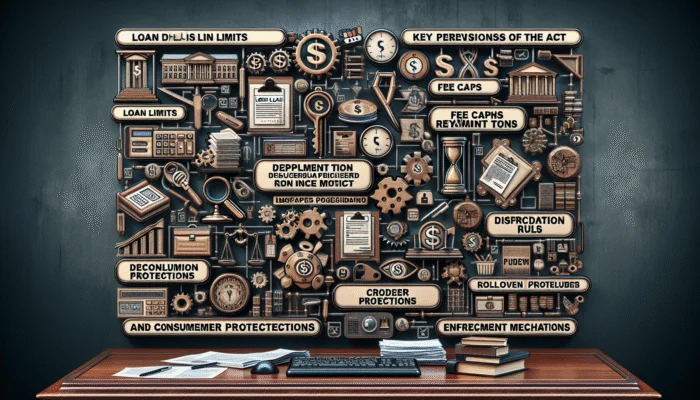Key Insights on Payday Loan Regulations in Mississippi
- Definition: Payday loans are high-interest, short-term loans due on the borrower’s next payday, often used for urgent financial needs.
- Regulatory Oversight: The Mississippi Department of Banking and Consumer Finance regulates payday lenders to ensure compliance and protect consumers.
- Legislation: The Mississippi Check Cashers Act establishes key provisions for payday loans, including maximum loan amounts and repayment terms.
- Consumer Protections: Borrowers have rights, including the ability to rescind a loan within 24 hours and receive clear disclosures of loan terms.
What Are Payday Loans and How Do They Work?

Payday loans are short-term, high-interest loans due on the borrower’s next payday, specifically designed for individuals facing immediate financial needs. They are commonly utilized for various purposes, including covering unexpected medical expenses, paying utility bills, and handling urgent personal expenses.
What Are the Benefits of Payday Loans?
Payday loans offer quick cash solutions for urgent financial situations, providing immediate relief to borrowers. For example, they can help cover unforeseen medical costs or pay essential bills to avoid disconnection.
What Are the Risks Associated with Payday Loans?
Despite their benefits, payday loans come with high-interest rates, leading to potential debt cycles. Borrowers often face significant repayment amounts, making it crucial to understand the loan terms before borrowing.
Who Regulates Payday Loans in Mississippi?

The regulation of payday loans in Mississippi is overseen by the Mississippi Department of Banking and Consumer Finance, which ensures that lenders comply with state laws and protect consumers from predatory practices.
What Are the Key Responsibilities of the Regulatory Body?
- Issuing licenses to payday lenders.
- Conducting regular audits and inspections.
- Monitoring compliance with state regulations.
- Investigating consumer complaints against lenders.
- Enforcing penalties for non-compliance.
- Providing consumer education about financial products.
- Updating regulations to adapt to changes in the industry.
What Legislation Governs Payday Loans in Mississippi?
The primary legislation governing payday loans in Mississippi is the Mississippi Check Cashers Act, which establishes a framework for payday lenders, including limits on loan amounts, fees, and repayment terms.
What Are the Key Provisions of This Act?

- Maximum loan amounts set at $500.
- Limitations on fees, including caps on the number of loans per borrower.
- Specific repayment terms requiring full payment on the next payday.
- Disclosure requirements for lenders regarding loan terms.
- Regulations on loan rollovers to prevent excessive debt.
- Consumer protections against harassment during debt collection.
- Enforcement mechanisms for compliance with penalties for violations.
How Are Payday Lenders Licensed in Mississippi?
The licensing process for payday lenders in Mississippi is rigorous, ensuring that only qualified entities can provide these high-risk loans. Lenders must submit a detailed application to the Mississippi Department of Banking and Consumer Finance.
What Does the Application Process Involve?
- Providing background information on the business and its owners.
- Disclosing financial statements and operational plans.
- Undergoing background checks on key personnel.
- Submitting proof of financial stability.
- Meeting state bonding requirements.
- Demonstrating knowledge of regulatory compliance.
- Proving adherence to ethical lending practices.
What Are the Consequences of Non-Compliance?
Lenders who violate payday loan regulations in Mississippi face significant consequences enforced by the Mississippi Department of Banking and Consumer Finance.
What Penalties Can Lenders Face?
- Monetary fines based on the violation’s severity.
- Suspension of the lender’s license.
- Revocation of the lending license.
- Mandatory reimbursement of illegal fees charged to borrowers.
- Increased scrutiny in future licensing efforts.
- Requirement for additional training for staff.
- Public disclosure of violations.
What Are the Interest Rates and Fees for Payday Loans in Mississippi?
The maximum interest rate for payday loans in Mississippi is capped at 520% APR, reflecting the high costs associated with short-term borrowing.
How Do Additional Fees Affect Borrowing Costs?
- Verification fees and processing fees are allowed but capped to ensure affordability.
- All fees must be disclosed clearly to borrowers before loan approval.
- Combined fees cannot exceed maximum allowable limits set by law.
What Are the Debt Collection Practices in Mississippi?
Payday lenders in Mississippi have specific methods for collecting debts, including phone calls and written communication, which must adhere to state and federal laws.
What Restrictions Are in Place to Prevent Harassment?
Mississippi law prohibits abusive language, threats, or intimidation during debt collection, ensuring that borrowers are treated fairly.
What Consumer Protections Exist for Borrowers?
Mississippi laws offer several consumer protections, including the right to rescind a payday loan within 24 hours of agreement without penalties.
What Are the Disclosure Requirements for Lenders?
Lenders are mandated to provide clear disclosures of loan terms, including APR, fees, and repayment schedules, enabling informed borrowing decisions.
How Does Mississippi Limit Loan Rollovers?
To prevent debt cycles, Mississippi law typically allows only one rollover, requiring borrowers to pay off the original loan before taking out a new one.
What Resources Are Available for Borrowers Seeking Help?
What State and Federal Agencies Can Assist?
Borrowers can seek assistance from the Mississippi Department of Banking and Consumer Finance and the Consumer Financial Protection Bureau for guidance and support.
How Can Non-Profit Organizations Help Borrowers?
Non-profit organizations provide financial counseling and debt management services, helping borrowers improve their financial literacy and avoid payday loans.
What Legal Aid Resources Are Available?
Legal aid organizations offer support for borrowers facing unfair treatment, providing legal assistance and representation in disputes with payday lenders.
FAQs
What is a payday loan?
Payday loans are short-term, high-interest loans designed to cover immediate financial needs, typically due on the borrower’s next payday.
Who regulates payday loans in Mississippi?
The Mississippi Department of Banking and Consumer Finance oversees the regulation of payday loans, ensuring compliance with state laws.
What are the maximum interest rates for payday loans in Mississippi?
The maximum interest rate for payday loans in Mississippi is set at 520% APR, reflecting the high costs associated with short-term borrowing.
How often can payday loans be rolled over in Mississippi?
Mississippi law limits the number of times payday loans can be rolled over, typically allowing only one rollover to prevent excessive debt.
What protections do borrowers have in Mississippi?
Borrowers in Mississippi have several protections, including the right to rescind a loan within 24 hours and mandatory disclosures of loan terms.
What penalties do lenders face for non-compliance?
Lenders found in violation of payday loan regulations can face fines, license suspension, or revocation, as well as mandatory restitution to consumers.
Can borrowers file complaints against payday lenders?
Yes, borrowers can file complaints with the Mississippi Department of Banking and Consumer Finance if they experience unfair treatment or illegal practices.
What resources are available for borrowers in Mississippi?
Borrowers can seek assistance from state agencies, non-profit organizations, and legal aid groups that offer financial counseling and support.
How does the payday loan cycle affect borrowers?
Frequent reliance on payday loans can lead to cycles of debt, negatively impacting borrowers’ financial health and causing increased stress.
What should borrowers consider before taking a payday loan?
Before taking a payday loan, borrowers should evaluate their ability to repay it, consider alternative lending options, and understand the total cost of borrowing.
See also: Madison, MS.

A Mississippi-based financial consultant with over a decade of experience in personal finance and payday lending. Originally from Jackson, he holds certifications in financial planning and credit advisory. Passionate about helping everyday Americans make smarter borrowing decisions, he focuses on guiding people away from common debt traps while promoting healthy financial habits. His expertise bridges the gap between short-term loan needs and long-term money management strategies. Outside of work, he volunteers with local programs that promote financial literacy across Mississippi.





Ah, payday loans in Mississippi—a topic that’s as vibrant and complex as a pot of gumbo simmering on the stove! You’ve perfectly captured the essence of these short-term financial tools, which, let’s be honest, can feel like the shiny apple dangling from the tree in a financial garden. At a glance, they look innocent enough, but get too close, and it’s a whole different story.
You’ve painted a vivid picture with that gumbo analogy. It’s interesting how payday loans can seem so appealing at first glance, much like that aromatic stew on the stove. But just like too many ingredients can ruin a gumbo, getting tangled up in high interest rates can make a payday loan more of a nightmare than a quick fix.
It’s great to hear that the gumbo analogy resonated with you. It’s a vivid reminder of how enticing something can be while hiding the pitfalls under the surface. The smell of that stew wafting through the air can draw you in, much like the promise of quick cash with payday loans. But just as overdoing it on the spices can lead to an overpowering taste, getting caught up in the cycle of high-interest rates with these loans often leads to a rather unpleasant experience.
You’ve captured the essence of the analogy perfectly. The appeal of payday loans often lies in the immediacy and convenience they promise, much like the tempting aroma of a cooking gumbo that draws you in. It’s easy to focus on that initial burst of relief they can provide, but just as with any recipe, the balance of ingredients is crucial.
You’ve hit the nail on the head with that comparison. It’s funny how something that looks so good at first can pack such a punch later on. Payday loans can really lure you in, especially when you’re in a tight spot and the glossy ads make it look like a simple solution.
You’ve really painted a vivid picture with that gumbo analogy. It’s interesting how payday loans can seem so appealing at first, but as you said, getting too close often reveals a more complicated, if not troubling, reality. I think it captures the dual nature of many financial products out there.
It’s great to hear that the gumbo analogy resonated with you. The complexity of payday loans often gets overlooked in the excitement of quick cash. It’s true, they can seem like a quick solution to an urgent financial need – like a hot bowl of gumbo on a cold day. But as you pointed out, getting up close often exposes the ingredients underneath that appealing surface.
This is an important topic, especially as many people find themselves in need of quick financial relief. I appreciate the focus on consumer protections in Mississippi; it’s crucial that borrowers are aware of their rights, such as the ability to rescind a loan within 24 hours. It reminds me of how essential financial literacy is in today’s world—not just knowing how to manage money, but understanding the terms and implications of loans like these.
It’s interesting to see how quickly the conversation around financial relief is gaining traction, especially with more people facing unexpected expenses. Your point about consumer protections in Mississippi highlights something that often goes overlooked—many borrowers don’t realize they have rights that can help them navigate tricky situations. The ability to rescind a loan within 24 hours is definitely a critical safeguard.
Your insights on payday loan regulations in Mississippi shed light on a topic that often doesn’t get the attention it deserves. The immediate financial needs that payday loans seek to serve show how crucial they can be in times of crisis. However, it’s equally important to recognize the potential pitfalls that come with high-interest rates and short repayment timelines.
It’s fascinating to dive into the nuances of payday loans and the regulatory landscape in Mississippi, especially given how these financial products have become a lifeline for many individuals facing immediate financial pressures.
This topic on payday loans really hits home for so many people struggling with financial instability. I appreciate how you outlined the regulations in Mississippi—knowing there is some oversight, like the Mississippi Department of Banking and Consumer Finance, must provide a little reassurance to consumers. However, the reality is that the high-interest rates and often confusing terms can trap borrowers, leading to a cycle of debt that is hard to escape.
Your breakdown of payday loan regulations in Mississippi raises important considerations that reflect broader financial literacy and consumer protection issues in our society. As you noted, these loans can serve as a temporary solution for urgent financial needs, but the high-interest rates often trap borrowers in a cycle of debt. This reality presents a paradox: while payday loans offer quick access to cash, they can also exacerbate financial instability for many individuals who already face economic hardship.
You’ve really hit the nail on the head with your thoughts on payday loans in Mississippi. It’s a complex issue that often gets oversimplified. On one hand, I can understand how people facing unexpected expenses might view payday loans as a lifeline. They can bridge the gap when you’re dealing with an urgent situation like car repairs or an unexpected medical bill.
I appreciate the insights you’ve shared on payday loan regulations in Mississippi. It’s such an important topic, especially considering the financial pressures many individuals face today. The characterization of payday loans as a lifeline for urgent financial needs resonates strongly with me, as I’ve witnessed firsthand how quickly emergencies can arise and throw someone’s budget into disarray.
It’s encouraging to hear your perspective on the impact of payday loans in Mississippi. You’re spot on about the financial pressures people face—it’s a reality that many find themselves navigating, often unexpectedly. Life can really throw some curveballs, and those moments when an urgent expense comes up can be overwhelming.
I found your insights into payday loan regulations in Mississippi to be quite illuminating, especially as I think about the broader implications these loans have on individuals’ financial health and societal well-being. It’s interesting how payday loans can serve as a lifeline for many people facing financial emergencies, but at the same time, they can lead to a cycle of debt that’s hard to break.